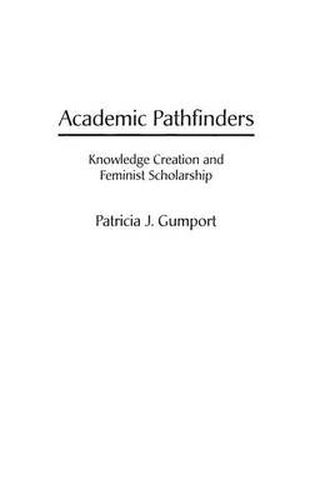Readings Newsletter
Become a Readings Member to make your shopping experience even easier.
Sign in or sign up for free!
You’re not far away from qualifying for FREE standard shipping within Australia
You’ve qualified for FREE standard shipping within Australia
The cart is loading…






Advances understanding of the dynamics of knowledge creation and the struggle for legitimacy that may accompany new scholarly ideas, such as feminist studies. From the 1960s to the 1980s, a range of academic possibilities for women developed, as their career histories and intellectual biographies reveal. Some women sought to generate a new knowledge specialty in their disciplines, often explicity defying admonishments that the subject matter was an oxymoron. Others pursued academic paths that disregarded these new opportunities and developments. Together their accounts portray how feminist scholarship emerged and was facilitated by historically specific conditions: a critical mass of like-minded women, a national political movement, an abundance of financial support for doctoral candidates, a tolerance from established faculty for students to pursue the margins of disciplinary scholarship, and an organizational capacity to add new academic categories for courses, programs, academic positions, and extra-departmental groups. That historical era has since been supplanted by feminist infighting and backlash, as well as more cost-conscious academic management practices, which have altered the academic landscape for knowledge creation. Analyzing the accounts of academic women during this era yields a conceptual framework for understanding how new knowledge is created on multiple levels-through personal reflection on life experiences, disciplinary legacies, local organizational contexts, and wider societal expectations.
$9.00 standard shipping within Australia
FREE standard shipping within Australia for orders over $100.00
Express & International shipping calculated at checkout
Advances understanding of the dynamics of knowledge creation and the struggle for legitimacy that may accompany new scholarly ideas, such as feminist studies. From the 1960s to the 1980s, a range of academic possibilities for women developed, as their career histories and intellectual biographies reveal. Some women sought to generate a new knowledge specialty in their disciplines, often explicity defying admonishments that the subject matter was an oxymoron. Others pursued academic paths that disregarded these new opportunities and developments. Together their accounts portray how feminist scholarship emerged and was facilitated by historically specific conditions: a critical mass of like-minded women, a national political movement, an abundance of financial support for doctoral candidates, a tolerance from established faculty for students to pursue the margins of disciplinary scholarship, and an organizational capacity to add new academic categories for courses, programs, academic positions, and extra-departmental groups. That historical era has since been supplanted by feminist infighting and backlash, as well as more cost-conscious academic management practices, which have altered the academic landscape for knowledge creation. Analyzing the accounts of academic women during this era yields a conceptual framework for understanding how new knowledge is created on multiple levels-through personal reflection on life experiences, disciplinary legacies, local organizational contexts, and wider societal expectations.